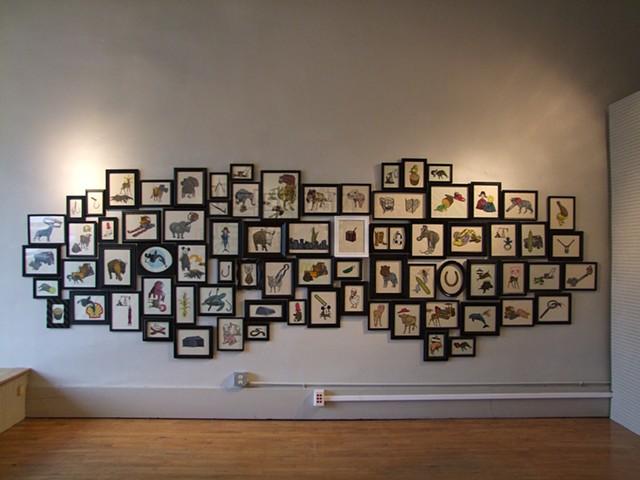Dark Cloud (2011 - present)
Dying to Please You
The first thing I am compelled to write seems obvious: You are an animal, and I am an animal.
And yet, due to an implicit logic of domination, most human animals go about their everyday routines – dressing, eating, drinking, consuming – oblivious to (or willfully ignoring) the non-humans that often suffer as a consequence.
You may ask, what is the logic of domination? You’ll recognize it in the following false binaries:
Male - Female
White – Black/Brown (race)
Straight – Gay
Nature – Culture
Once such a binary relationship is established, the two concepts are invariably pitted against one another, competing for status and resources. (This competition is exacerbated under capitalism, which requires that some be pushed to the bottom in order for others to ascend.)
I have always appreciated the succinct way in which ecofeminist writer, educator and activist pattrice jones explains the dangers of such logic, as it relates to the human/non-human paradigm:
Animal subordination lays the groundwork for other oppressions. It requires that a thick line be drawn between human animals and other animals. Animals on one side of the line are considered worthy of compassion, respect, even legal protections, while animals on the other side of the line are “othered”, regarded as objects to be owned, controlled or eradicated. Beginning from this position, it is easy to shift the line slightly, so that some humans are grouped with the animals and also treated as lesser. As long as some living beings are considered subordinate, no group of people is safe from the possibility of also being deemed without rights, or even worthless.
Jones and other deep thinkers, like Carol Adams, Steve Best and Marjorie Spiegel, have demonstrated through their scholarship that the dominance humankind assumes over other animals is the original social hierarchy - upon which all other destructive binary relationships are patterned.
Despite the evident truth of this assertion, most humans participate in the subjugation and exploitation of non-human animals for nothing more than pleasure and profit, even when afforded the agency to make alternate choices.
I think of these questions continually:
When is another animal worthy of our moral consideration? How intelligent must they be, and by whose measures? How like us in appearance? How large? How cute, or seemingly friendly? How useful to us? How threatened by extinction? How do these questions (and their answers) translate with respect to our regard for other humans?
We recognize that non-human animals are torn from their own unique ecologies - habitats, families and social systems - to serve as our entertainment, or as the subjects of study and cruel experimentation. They are born and languish in stifling, stinking cages or swim in circles until they die…for our amusement and gustatory preferences. They are relentlessly slaughtered for our sadistic traditions, for sport, for shoes, upholstery and other accessories.
We practice willful ignorance or selective morality at our own peril. Humankind’s violent relationship to other species has resulted in the cataclysmic destruction of the planet we share, and the ruination of our own bodies. With each word I type, vast swaths of rainforest are cleared for grazing cattle and growing feed crops, air and water are poisoned by floods of unmanaged fecal waste from factory farms. Human workers (predominantly Black and Brown) risk their lives wading through fields sprayed with liquefied shit to pick lettuce, or slip in puddles of blood while wielding massive mechanized blades to render the flesh of other animals into pieces.
Imagine how the violence we visit upon non-human beings prepares us for the violence we do to one another. Imagine how it prepares us for waging war, building prisons, committing murder…for torture, rape and domestic abuse.
It seems worthy of emphasis: When one being conceives of another as somehow less significant than themselves, bad things ensue (for all involved.)
We are all animals, interconnected.
Brett Colley
